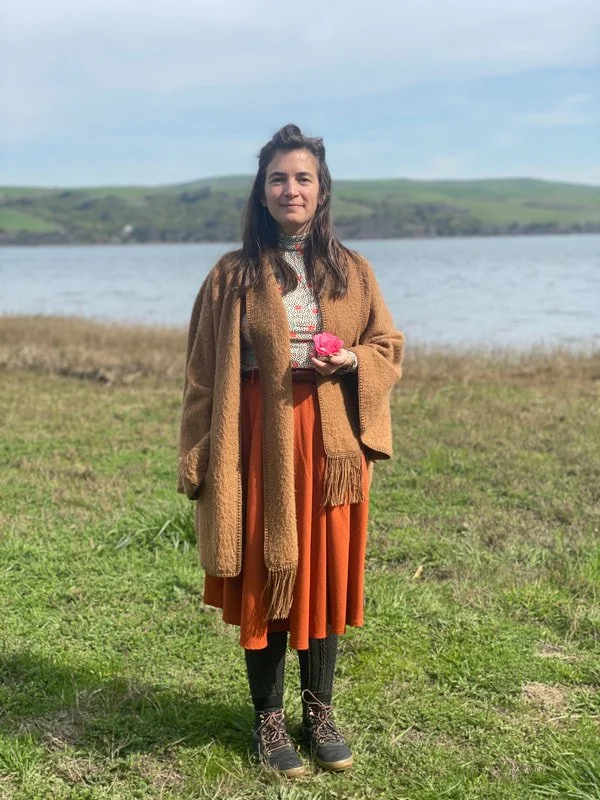Got internalized white superiority? The danger of denial and the promise of another way
Listen to an interview with Jen on The Diversity Gap podcast about racism, common hang ups white leaders face as they try to pursue antiracist lives and leadership. In this interview, Jen shares personal examples of internalized white superiority.
A page from the notebook I used during the Undoing Racism, People’s Institute for Survival and Beyond workshop I took in 2008, the first time I heard the phrase “internalized racial superiority.” (1)
More white people now than ever, perhaps, are talking about and interested in racial justice in the U.S. We are visiting the Equal Justice Initiative’s lynching memorial and museum in Montgomery, Alabama; we are reading Robin DiAngelo’s White Fragility; we are “woke.” And yet, in my work as a racial justice educator, I see white leaders of nonprofits, businesses, health and education departments struggling the most to look inward when it comes to race. Perhaps it’s easier to own the privileges we experience as white people because those are about how we are treated by systems and by other people. But to be open to seeing the ways in which the way I lead, the programs I have developed, and the relationships I have with people of color may be tinted by my own racial biases; this is where I see a lot of resistance from white people. And I empathize. I feel icky every time I use the phrase “internalized white superiority.” It’s shameful and embarrassing. And I use this phrase purposefully in my work. While none of us were born with racist ideas or beliefs, we begin to internalize them as toddlers by observing what is happening all around us.
Ok, so what is internalized white superiority? I think a lot of people are more familiar with internalized inferiority for people of color as one of the many ways racism works. I’d like to challenge white folks who are wondering, “What?! How could I possibly have that?! I love the people of color in my life--my friends, family members. I absolutely do not believe that white people are better in any way than people of color.” In a racist society, everyone internalizes racist beliefs to some degree.
A simple way to define internalized white superiority is as the beliefs, thoughts, and assumptions (of white people and cultures as better than other racial groups) that live inside of my white body and my white brain, which influence my actions.
You might think of this like a spectrum. Internalized white superiority is everything from people on the one extreme, “I believe white people are superior to people of all other races” to people on the other extreme, “Of course I do not believe that white people are superior; I am not racist!!” although in reality I do believe this on a subconscious or unconscious level and I act according to those beliefs daily. These dangerous and false racist ideas were invented approximately five centuries ago by Europeans.(2) They need not go unchecked any longer.
This is a list of ways that internalized white superiority often shows up. I compiled this list from multiple sources including dRworks and Robin DiAngelo, and from my own experience:
Entitlement: I have a right/title/claim to this; I deserve what I have; I have the right to define things how I see them and demand that others accept my definition
Right to comfort: I have a right to be comfortable and if I am not, then whoever is making me uncomfortable is to blame; politeness is valued over honesty
Intellectualization: Concepts and theories matter; feelings are inferior to thinking
Perfectionism: Mistakes reflect badly on people; it's not ok to fail or mess up
Paternalism: I and other white people/organizations know what is best for others; people of color need our help
Defensiveness: I am good and my intentions were good; I am unwilling to hear about ways others have been harmed by my actions or inactions
Normative: my worldview is the universal world view; our standards and norms are universal. For example - Think about who and how these terms are defined: good parenting, stable family, well raised child, individual self-sufficiency, and effective leadership.
Fantasy of fragility: When I experience discomfort in the presence of Black, Indigenous, People of Color; or when matters of race come up, I confuse fear with danger and comfort with safety, triggering a fight, flee or freeze response (read more about this here and here)
Silence: Being silent when racism shows up is neutral, not doing any harm; I will wait until I know exactly what to say before I speak up
Colorblindness: I see all people the same; I believe all people are equal; I don't see color; bias and difference are bad; talking about racism is “racist” or an attack on white people
Cognitive dissonance: I am not responsible for racism that other white people perpetrated in the past, nor do I have to know anything about it; I have a right to be ignorant
Distancing/exceptionalism: racism is just about a few bad apples (e.g., a few corrupt police officers, or a few mentally unstable terrorists, or a few self-described white supremacists)
Meritocracy: my achievements have to do with me, not with my membership in the white group; I can feel that I personally earned, through work and merit, any/all of my success; I have many choices, as I should; everyone else has those same choices
Tokenism: I will recruit or engage only a small number of people of color who fit into my worldview or way of doing things to give the appearance of racial equality in this process or organization
Ok, so that’s a lot to digest. For some personal stories about how this shows up, listen to this interview with me. All of these are learned beliefs and behaviors; all of them can be unlearned and replaced. It is on us, as white people, to undo internalized white superiority in ourselves, our institutions, homes, and communities. We must not wait for or rely on Black, Indigenous, and People of Color to explain it to us or to see it for us. Learning to see the ways in which I have internalized beliefs in the superiority of white people and white ways of being/doing further equips me to show up as a white accomplice to Black, Indigenous and People of Color. Why? Because as I learn how I “caught” these messages, I can get better at spotting them when they show up in me and I can get better at uprooting them. This level of antiracism(3) work keeps me humble; it requires building my own stamina internally, for seeing things within myself that I don’t like or want and moving through them to learn and teach myself another way of being.
Take on your internalized white superiority, like you take on anything else in your life that you want to change, by:
Choosing to take the uncomfortable path
Making peace with the fact that internalized white superiority (yes, racism!) exists within you
Building a practice of noticing when and how your internalized white superiority is showing up
Releasing perfectionism and unrealistic expectations of yourself
Working through it with a supportive therapist
Talk to other white people about it, and lean on each other for support in uprooting your internalized white superiority and replacing it with more intentional antiracism
Recommended resources for everyone:
Recommended resource for people raising or working with white kids:
1. According to The People's Institute for Survival and Beyond, Internalized Racial Oppression manifests itself in two forms: Internalized Racial Inferiority (The acceptance of and acting out of an inferior definition of self, given by the oppressor, is rooted in the historical designation of one's race. Over many generations, this process of disempowerment and disenfranchisement expresses itself in self-defeating behaviors) and Internalized Racial Superiority (The acceptance of and acting out of a superior definition is rooted in the historical designation of one's race. Over many generations, this process of empowerment and access expresses itself as unearned privileges, access to institutional power and invisible advantages based upon race).
2. See Stamped from the Beginning: A History of Racist Ideas by Ibram X. Kendi, My Grandmother’s Hands: Racialized Trauma and the Pathway to Mending our Hearts and Bodies by Resmaa Menakem, Unsettling Truths: The Ongoing, Dehumanizing Legacy of the Doctrine of Discovery by Mark Charles and Soong-Chan Rah
3. I draw on Ibram X. Kendi’s work here (How to Be an Antiracist), using the term “antiracism” because antiracism requires proactive daily practice. I agree with Kendi that there is no such thing as “not racist” because in every moment and with every action, we are either colluding with racism or proactively promoting antiracism. He defines an antiracist as “someone who is expressing the idea that racial groups are equals and none needs developing.”
“Our grandparents called themselves Christians and sometimes believed they were. Believing it, they were compelled to believe it was morally right for them to hold slaves. They could not say, ‘We shall keep our slaves because they are profitable, regardless of right and wrong.’ A few tough old realists who didn’t claim to be in the Fold probably did say it. But to most, such words would have seemed as fantastic as a confession of their mixed reasons for opposing slavery would have seemed to the Yankees. Our grandfathers’ conscience compelled them to justify slavery and they did: by making the black man ‘different,’ setting him outside God’s law, reducing him to less than human. In a way that would have seemed blasphemous, had they stopped to think, they took God’s place and ‘decided’ which of His creatures have souls and which do not. And once doing it, they continued doing it, and their sons continued doing it, and their grandsons, telling themselves and their children more and more and more lies about white superiority until they no longer knew the truth and were lost in a maze of fantasy and falsehood that had little resemblance to the actual world they lived in.”
From Killers of the Dream, by Lillian Smith (1949)
Jen Willsea is an Atlanta-based queer mama, sewist and dreamer living on unceded Muscogee/Creek territory and on a Civil War battle site, with settler colonial ancestors who left The Netherlands and England in the 1600s to claim Haudenosaunee and Wampanoag land. Jen is recognized in Atlanta and across the U.S. as one of the most highly skilled white anti-racist facilitators of our time. People know Jen as open, warm, bold, and unwavering in her commitment to living with integrity and in community to build a future beyond white supremacy. Her personal antiracism journey began 20 years ago as a young activist. For more than a decade, Jen has guided groups across the U.S. to strengthen their social and racial justice work--as a facilitator, coach, consultant, and organizer. Jen was Senior Associate at the Interaction Institute for Social Change 2008-2018 (IISC is a nonprofit consulting firm that builds collaborative capacity for people and groups working for social justice and racial equity), and Member of the Board of Directors at Resource Generation 2009-2017 (RG is a group that organizes young people with wealth and class privilege toward equitable redistribution of land, wealth and power). After the murder of Michael Brown by a white police officer in 2014, Jen worked with other folks in the RG community to launch and lead the It Starts Today campaign, organizing $1.4 million in funding to more than 100 Black-led groups "organizing for Black liberation" across the U.S. In 2019, Jen worked in a white accomplice role to help launch The Black Mecca Project. Jen’s work is motivated by a love for humanity and the earth, and a belief that white people can and must transform ourselves if we are to end white supremacy and participate in a future in which people of all races can thrive.



